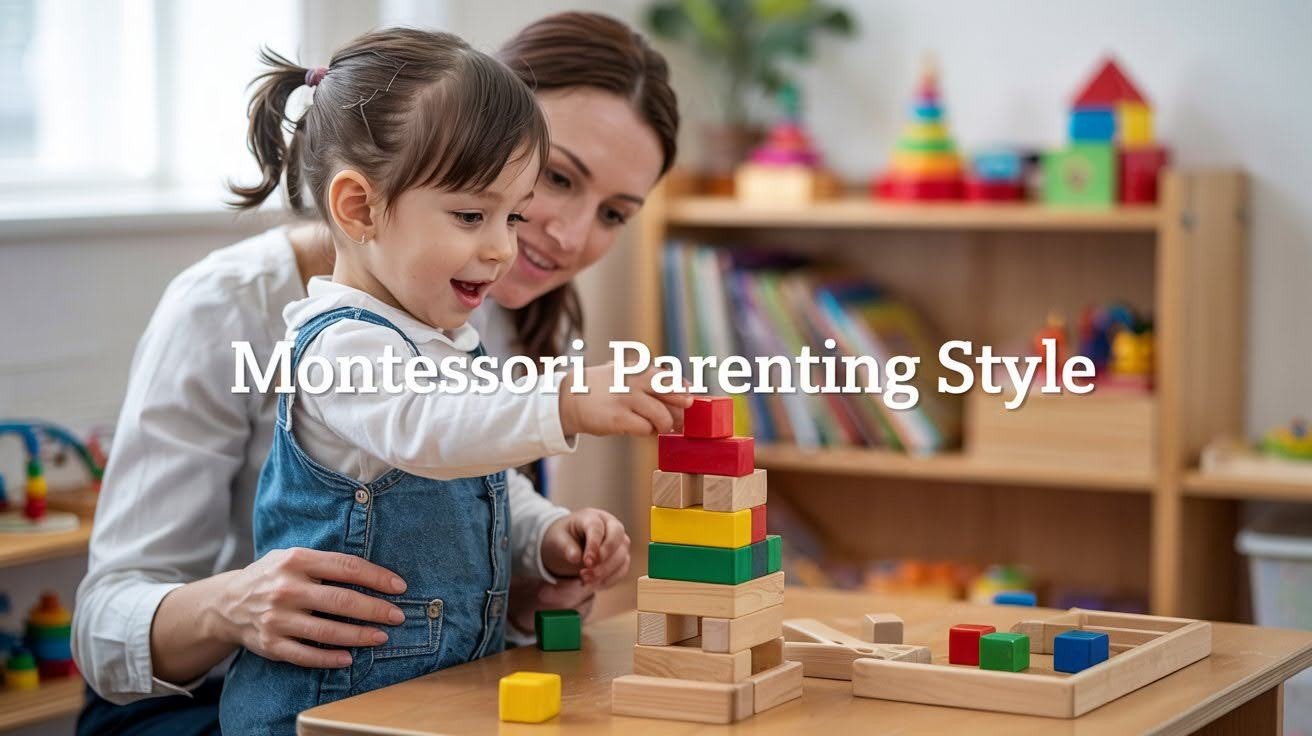What if parenting could help children grow confident, solve problems, and make good choices on their own? The Montessori parenting style offers a gentle and practical way to support this growth. Instead of relying on control, it encourages respect, independence, and teamwork within the family.
Created more than a century ago by Dr. Maria Montessori, this approach has guided millions of children worldwide. It focuses on hands-on learning and real-life experiences rather than strict rules or punishment.
When parents use these ideas at home, they become guides instead of directors. This helps children learn responsibility, think for themselves, and build strong relationships with their families, skills that carry into everyday life.
What is Montessori Parenting Style?
The Montessori parenting style adapts Dr. Maria Montessori’s educational philosophy for home use, focusing on respect, independence, and natural learning:
Definition and origins from Dr. Maria Montessori
- Dr. Maria Montessori created this method in the early 1900s after observing how children learn best.
- Her approach emphasized following the child’s natural development rather than forcing adult expectations.
Educational philosophy adapted to the home environment.
- Parents create learning opportunities within daily routines and household activities.
- The home becomes a place where children can practice real-life skills safely.
Balanced approach emphasizing independence, creativity, and individualized learning.
- Each child’s unique interests and abilities guide their learning path
- Parents support growth in all areas: physical, emotional, social, and intellectual development
Fundamental Principles of Montessori Parenting
These core principles shape how the Montessori parenting style works in daily family life, creating respectful relationships between parents and children.
Independence
- Children learn to complete age-appropriate tasks without constant adult help.
- Parents step back to let children try, fail, and succeed on their own terms.
- Self-directed activities allow children to choose what interests them most each day.
- Building confidence happens when children master skills through repeated practice.
Respect for the Child
- Parents honor their child’s individual personality, interests, and natural development timeline. ine
- Respectful communication replaces commands, threats, or bribes in family interactions.
- Cooperative environments emerge when everyone’s needs and feelings matter equally.
- Children learn respect by experiencing respectful treatment from their parents daily.
Self-Directed Learning
- Parents observe their child’s interests and provide materials that support natural curiosity.
- Learning happens through exploration and hands-on experiences rather than forced instruction.
- Educational materials become available when children show readiness and interest.
- Parents support but don’t direct their child’s learning process or timeline.
The Prepared Environment Concept
The prepared environment forms the foundation of successful Montessori parenting style implementation at home.
Child-sized furniture and accessible materials
- Low shelves, small tables, and child-height hooks allow independent access to belongings.
- Materials stay organized and available so children can choose and return items easily.
Organized, structured spaces that promote independence
- Each item has a specific place, teaching children to maintain order naturally
- Spaces remain uncluttered so children can focus and move freely throughout their day
Creating environments that support natural development
- Room arrangements change as children grow and develop new interests and abilities
- Parents regularly observe and adjust spaces to match their child’s current developmental needs
How to Implement Montessori Parenting?
This section shows how to bring Montessori principles into everyday family life. It covers practical strategies, daily routines, and hands-on activities that help children develop independence:
- Create a Prepared Environment: Set up child-friendly spaces at home with accessible shelves, tools, and materials to encourage exploration and independence.
- Establish Consistent Routines: Use predictable daily schedules for meals, play, and chores to foster security, responsibility, and time management.
- Encourage Practical Life Skills: Involve children in cooking, cleaning, dressing, and organizing to build confidence and independence.
- Offer Hands-On Learning Activities: Provide tactile materials, puzzles, and real-life problem-solving tasks that promote focus, coordination, and critical thinking.
- Foster Choice and Autonomy: Allow children to make simple decisions, such as selecting activities or clothing, to support self-confidence and responsibility.
- Observe Before Intervening: Watch children’s interests and needs, guiding subtly rather than taking control, to nurture intrinsic motivation.
- Promote Respect and Collaboration: Encourage polite communication, empathy, and teamwork through shared tasks and family interactions.
How to Practice Montessori Parenting?
The Montessori parenting style shines in everyday family life when principles are put into practice. It’s not about creating special lessons but about turning daily routines and home environments into opportunities for growth, independence, and respect.
- Transform Daily Chores into Learning: Let children help with cooking, cleaning, or setting the table to develop practical skills and responsibility.
- Use Child-Sized Tools and Spaces: Provide low shelves, small utensils, and accessible furniture so kids can move and act independently.
- Encourage Self-Dressing and Hygiene: Allow children to choose their clothes and manage personal care, fostering confidence and autonomy.
- Incorporate Learning into Play: Use everyday items for counting, sorting, or creative activities that teach problem-solving and observation.
- Follow the Child’s Lead: Observe interests and guide gently instead of directing every action, supporting natural curiosity and motivation.
- Create Calm and Orderly Spaces: Keep environments organized, uncluttered, and predictable to help children focus and feel secure.
- Model Respect and Patience: Demonstrate polite communication, empathy, and cooperation, showing children how to treat others and themselves.
Practical Tips for Encouraging Independence in Children
Simple strategies parents can use to help kids grow more confident and capable in everyday life.
- Start Small: Begin with one area, routine, or activity, and gradually expand as children adjust.
- Be Patient: Allow children to complete tasks at their own pace, even if it takes longer than doing it yourself.
- Encourage Independence: Not Perfection: Focus on effort and learning rather than flawless results.
- Keep Materials Accessible: Store toys, tools, and learning materials where children can reach them safely.
- Observe Often: Watch your child’s interests and strengths to guide activities naturally without imposing.
- Celebrate Achievements: Acknowledge progress, big or small, to build confidence and motivation.
- Stay Consistent: Consistency in routines, expectations, and guidance helps children feel secure and fosters self-discipline.
Conclusion
The Montessori parenting style gives families a practical way to raise confident, respectful, and capable children. By focusing on patience, respect, and hands-on learning, parents create a home where children feel supported as they grow at their own pace. This approach reduces the pressure of comparison and helps kids build independence in a safe, caring environment.
Prepared spaces and clear communication form the heart of this style, guiding children toward responsibility and problem-solving skills. More importantly, the lessons extend far beyond school or academics.
Children raised with respect and independence learn how to manage emotions, work with others, and build healthy relationships. With consistent practice, Montessori parenting strengthens both family connections and life skills that last into adulthood.
Frequently Asked Questions
At what age should parents start using the Montessori parenting style?
You can begin using Montessori principles from birth. Even your little one benefits from respectful communication, prepared environments, and opportunities for independence. Starting early sets positive habits, but it’s never too late to adopt this approach in your family.
How does the Montessori parenting style handle discipline and behavior issues?
Instead of punishments or rewards, Montessori focuses on natural consequences. Your child learns from real experiences, while you gently guide using respectful communication and clear, logical boundaries. This approach nurtures understanding, responsibility, and better decision-making over time.
Can the Montessori parenting style work with busy family schedules?
Absolutely! You can integrate Montessori principles into any routine. Simple adjustments like child-accessible storage, involving kids in chores, and offering meaningful choices help your child grow independently. Quality, mindful interactions matter far more than long hours together.
What if only one parent wants to use the Montessori parenting style?
Even if only one parent practices Montessori, it can positively influence your family. By modeling respect, independence, and patience, you gently inspire others. Start with small changes and show how these principles improve your child’s confidence and cooperation.
How do I know if the Montessori parenting style is working for my family?
Look for signs like your child becoming more independent, confident, and emotionally regulated. Notice improved problem-solving skills, cooperation, and helpfulness. Changes happen gradually, so patience, daily observation, and celebrating small progress make the process meaningful for your family.








